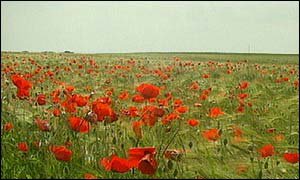
Wilfred Owen
Dulce et decorum est
Bent double, like old beggars under sacks,
Knock-kneed, coughing like hags, we cursed through sludge,
Till on the haunting flares we turned our backs
And towards our distant rest began to trudge.
Men marched asleep. Many had lost their boots
But limped on, blood-shod. All went lame; all blind;
Drunk with fatigue; deaf even to the hoots
Of tired, outstripped Five-Nines that dropped behind.
Gas! Gas! Quick, boys! – An ecstasy of fumbling,
Fitting the clumsy helmets just in time;
But someone still was yelling out and stumbling,
And flound'ring like a man in fire or lime. . .
Dim, through the misty panes10 and thick green light,
As under a green sea, I saw him drowning.
In all my dreams, before my helpless sight,
He plunges at me, guttering, choking, drowning.
If in some smothering dreams you too could pace
Behind the wagon that we flung him in,
And watch the white eyes writhing in his face,
His hanging face, like a devil's sick of sin;
If you could hear, at every jolt, the blood
Come gargling from the froth-corrupted lungs,
Obscene as cancer, bitter as the cud
Of vile, incurable sores on innocent tongues,
My friend, you would not tell with such high zest
To children ardent for some desperate glory,
The old Lie; Dulce et Decorum est
Pro patria mori.
Memories of Auschwitz
"Sometimes I was too sick to eat my soup, but I treasured it so much that I hid that little soup behind my bunk. One day when there was an inspection, the guards found the soup I was hiding. We weren't supposed to have any soup in the barracks. They took me outside and beat me. I passed out after three blows. A friend gave me coffee. He saved my life because I felt so sick I couldn't even move. With the coffee I was able to stand up when the camp officials came into the barracks for the next inspection. Anybody who couldn't move from his bed was taken away during the day sometimes.
One time I was taken to do a little work carrying steel beams. It was winter time, very cold. Fifteen or twenty guys were lifting each side of the beam because it was a wide beam. Eventually they told us to place it somewhere. But when we tried we couldn't tear away our hands from the steel because they were frozen to the beam. The skin came off and started bleeding. They didn't permit us to put any kind of cloth over our hands. We had to carry it bare. The next day we put this same beam back in the original spot.
The SS loaded us into cattle cars and took us to a forced labor camp in western Germany called Sachsenhausen. There was no crematorium, so it was by far a better feeling...We could hear the machine guns and the heavy artillery booming and they told us to march. The Allies were getting closer. I marched for about five kilometers to Allach which was a tiny little camp. Then I felt I couldn't walk anymore. The rest of them continued walking. The Germans killed all the people who kept walking. That was the death march. I survived because I could not walk."
Because it's not just about the Gulf.
